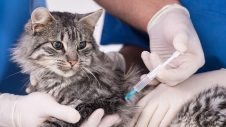Feline Immunodeficiency Virus
It is estimated that between 14% and 29% of cats in Australia test positive for feline immune-deficiency virus, or FIV for short. Male outdoor cats are at the highest risk of disease, especially if they fight with other cats but females also catch FIV. If your feline friend spends time frolicking outdoors or has been exposed to cat fights, then talking to your local Greencross Vets team about incorporating a vaccination into your pet’s preventative health care program is important.

What is FIV?
FIV stands for Feline Immunodeficiency Virus. You may recognize a similar disease process in humans, called HIV. There are many similarities between the two viruses, however, it is important to realize a human cannot be infected by a cat with FIV!
FIV suppresses the immune system of the cat, which means it cannot fully protect itself against common bacterial and viral infections. This is not great considering the things our cats like to get up to.
Cats are very good at hiding illness. Most commonly, FIV cats present with being ‘off colour’, weight loss, weakness, mouth sores or reoccurring infections.
How do we know if a cat has FIV?
Your vet can diagnose FIV after a thorough examination and a small blood test which detects antibodies to the virus. Testing can occur both within the veterinary clinic and at the external laboratory.
Often if the in-clinic test is positive, your veterinarian will confirm this with a blood sample at the external laboratory.
Early detection of FIV is very important, not only to ensure the cat’s extra needs are met but also to prevent spreading the infection to other cats.
How is FIV spread?
There are a couple of ways cats can become infected with this disease. The most common is by fighting or mating with an infected cat or, less commonly, via shared food and water bowls. This is why un-neutered male cats are overrepresented in FIV cases.
The virus is transmitted in the saliva and blood of the infected cat.
Signs and Symptoms of FIV
Cats infected with FIV may remain healthy for a number of years. While some infected cats show no sign of disease, others may display initial symptoms.
Initial symptoms can include;
- Fever
- Loss of appetite
- Lethargy
- Swollen lymph nodes.
Progressive symptoms can include;
- Weight loss
- Eye lesions
- Poor coat health
- Sores in and around the mouth
- Chronic infections
- Recurrent infections
- Cancer.
Eventually, the immune system becomes too weak to fight off other infections or diseases. As a result, the cat will die from one of these subsequent diseases.
How long will it take my cat to show symptoms of FIV?
After infection, there is a period of variable length during which the virus is present in the cat’s body but may not cause the cat to become unwell. In fact, some infected cats may live for a long time without any outward signs of illness. However, as the virus replicates, it can compromise the immune system, causing a variety of clinical signs. In some cases, these signs may be seen within months, but they can occur after several years.
What happens if my cat is FIV+?
Cats that test positive for FIV need to be seen by the vet twice yearly to ensure that their special requirements are met and nutrition and parasite prevention is taken care of. Also, it is responsible to keep your infected cat indoors or within the property in order to decrease the spread of FIV.
How to prevent FIV
Since the major route of infection is via cat bites, keeping cats indoors and away from potentially infected cats, is the best way to reduce their exposure. The only foolproof way to do this is to keep them exclusively indoors or in a cat enclosure. Where this is not possible or practical, an FIV vaccine is available for cats at risk of infection i.e. for cats with any outdoor access or cats living with an FIV infected cat.
Vaccination against FIV
The FIV vaccination course consists of an initial course of 3 vaccinations 2-4 weeks apart, then yearly boosters. Vaccination has been shown to be effective at reducing the risk of infection in an Australian field study, however the only foolproof way of preventing infection is to prevent contact with infected cats by keeping your cat indoors or in an enclosed cat run.
Is there a treatment for FIV?
There has been no successful treatment found for FIV infection. All we can do is stay alert for the early signs of disease and treat any infections and problems that develop as they arise. It is important to note that in many cases, infected cats can live a healthy life with appropriate veterinary care.
Responsible ownership of an FIV infected cat
FIV positive cats should be kept indoors both to limit their exposure to other infections and to prevent spread of the infection to other cats. Any FIV negative cats in your household can be vaccinated to help prevent infection.
If you suspect that your cat may have been exposed to FIV or you wish to organise their vaccinations, contact your local Greencross Vet for more information and assistance.

 Greencross Vets
Greencross Vets 










